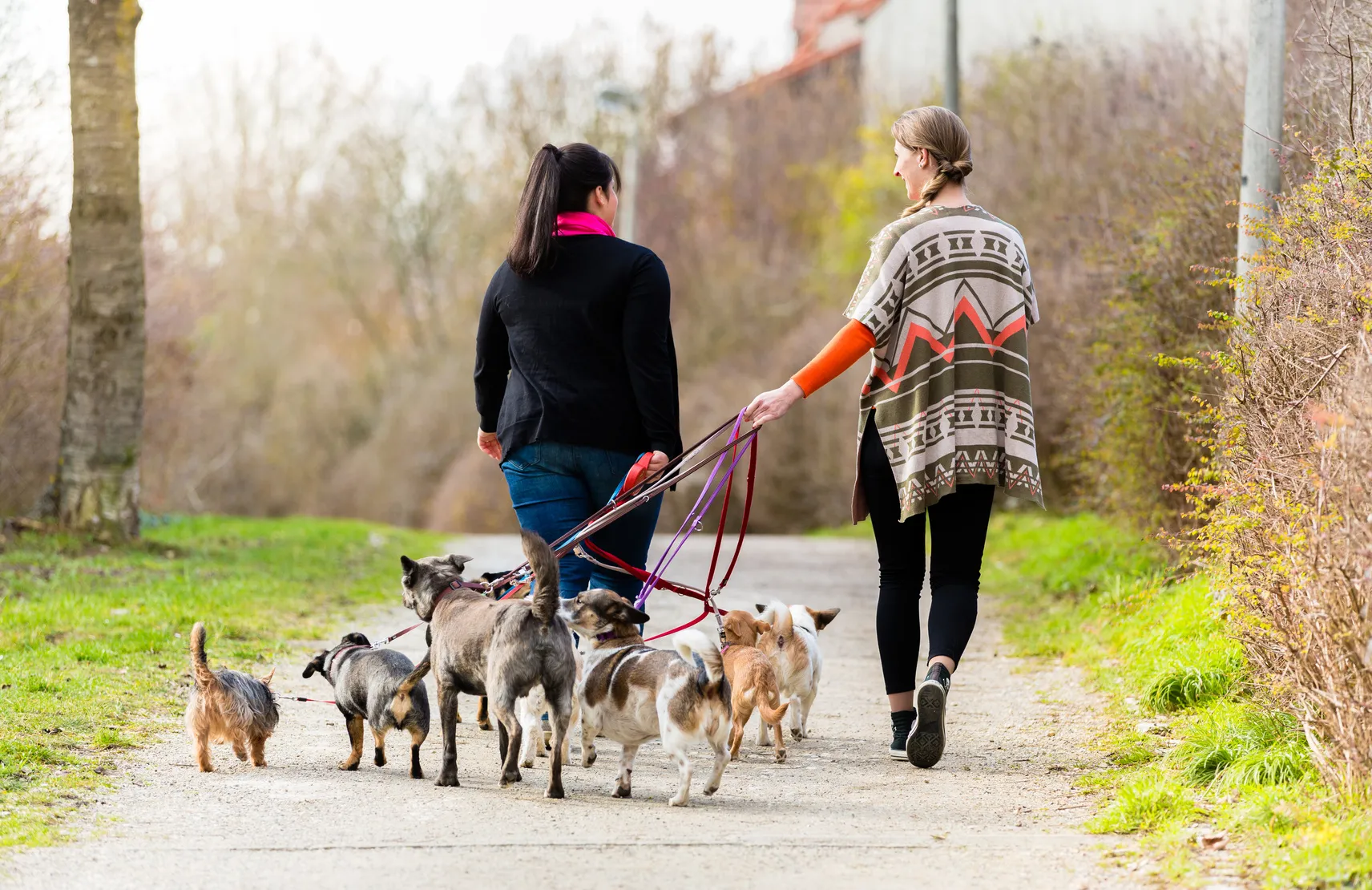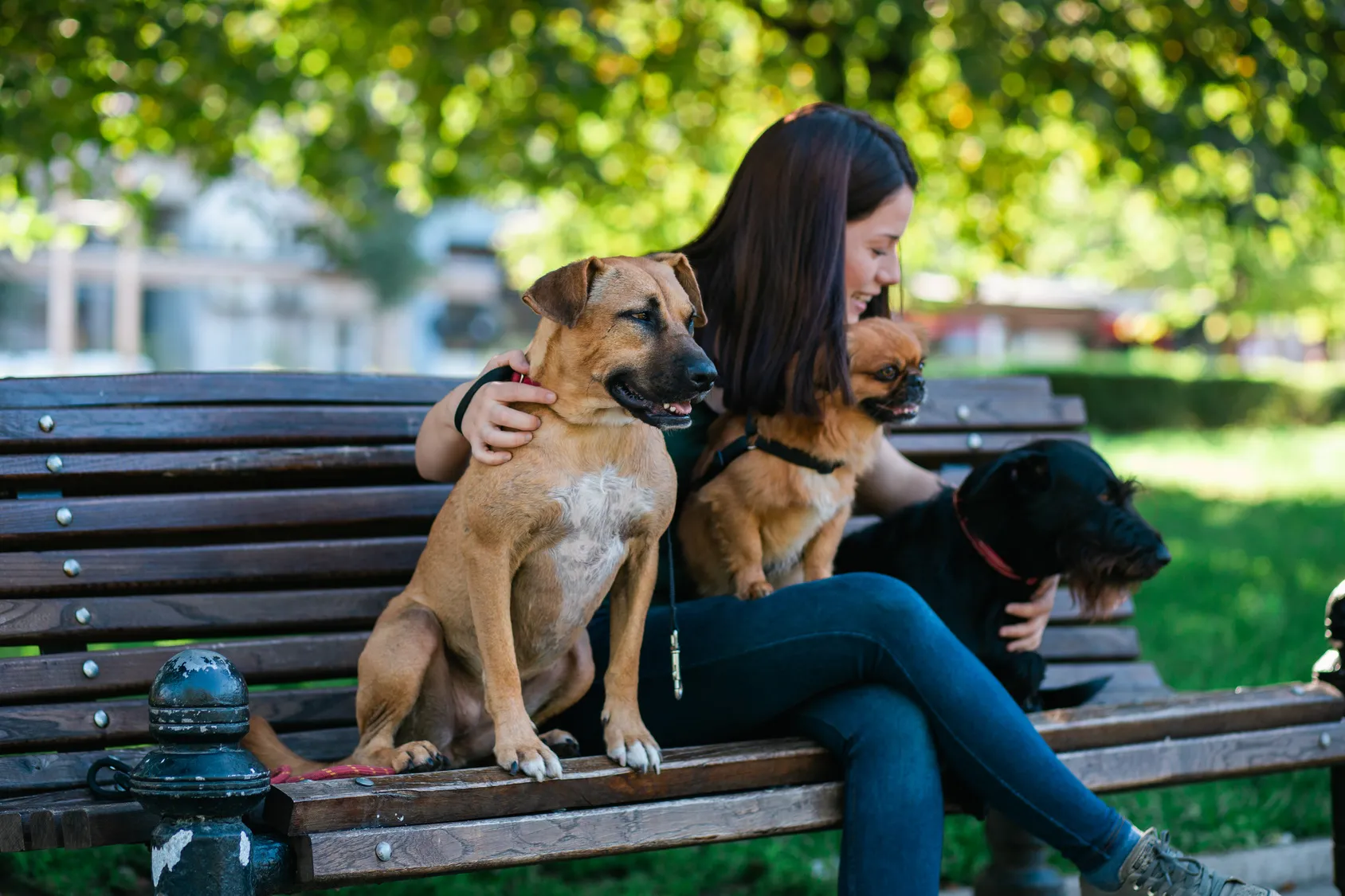Hiking with Dogs – Everyday Adventures
Be it short hikes in the surrounding area, day trips at the weekend or whole hiking holidays with your dog, hiking is a great hobby for human-canine teams!
Holidays at last! But what if your dog can't come with you? A dog-sitter or boarding kennels can help in this case. But which form of care is better for dogs, how high are the costs and what needs to be considered? We will show you advantages and disadvantages and give you tips for successful accommodation for your pet.

© © Parilov / stock.adobe.com
Happy Labrador in the park on a summer's day
Whether it’s a private trip or going abroad for work, your own dog can’t always come with you. This could be because the flight is too long, the car journey too arduous, the entry requirements for dogs too strict or the hotel doesn’t allow pets. There are many reasons why dogs have to stay at home. The selection of dog care during the holidays is broad in many cities and online. But where is your dog best off: with a dog-sitter or in boarding kennels?
Ideally, dogs would stay with family members or close friends during a long absence of their owner. However, not all dog owners can resort to a private solution like this. In this case, a place in boarding kennels seems a good alternative. Several dogs are housed at the same time in rooms or kennels. This may be together with other dogs or alone depending on their level of sociability.
The quality of accommodation can differ significantly – from lovingly furnished, clean hotel rooms with dog toys to bleak, dingy boarding kennels, everything is possible. There are major differences between boarding kennels regarding staff too. Some boarding kennels are very family-run and try to pay their four-legged guests as much attention as possible. However, other kennels often have six or more dogs to an individual employee. As a result of such staffing conditions, individual care taking into consideration the exercise and activity requirements of each individual dog cannot be guaranteed. There are big differences in relation to costs, although expensive doesn’t necessarily mean good.
In order to be certain that your pet is well accommodated, you need to take a close look at the boarding kennels beforehand. Are the rooms bright and clean? Is there a relaxed and pleasant atmosphere? How many staff are present and what impression do they give you? How do they treat the dogs? Do they get sufficient outdoor access?
Do the dogs get their usual food? You can only get answers to these questions by visiting in person and having a face-to-face conversation with the kennel owners. Depending on the distance from your home, it’s sometimes recommended to visit the boarding kennels unannounced. Like everything, there are unfortunately boarding kennel owners who promise a lot but don’t keep their word.
 © © Kzenon / stock.adobe.com
© © Kzenon / stock.adobe.com
In addition to the aforementioned fact-check focusing on cleanliness, staffing conditions and feeding methods, you should always listen to your gut when visiting boarding kennels – and your dog’s too. After all, most dogs have a sure sense of who they can and can’t trust. So observe your dog very closely during the visit. How does it behave in the boarding kennels? Does it react in a friendly and curious way to the staff or is it shy or nervous?
Not all dogs are suitable for accommodation in boarding kennels. Some are distraught because of a change in their usual environment, the separation anxiety and unfamiliar humans and dogs. Staying in boarding kennels would be sheer stress for them. Hence, weigh up closely what you can trust your dog with. If your dog soon establishes trust towards other humans and happily plays with other dogs, staying in nice boarding kennels could be good for it. Sometimes it even feels like a holiday for your dog!
If your dog is of a suspicious breed that struggles with big changes, a dog-sitter may be a better choice. Dog-sitters generally only take on one to a maximum three foster dogs at a time, allowing for more intensive care of each individual dog. The dog usually moves into the home of the dog-sitter during your absence. Although it has to get used to new surroundings, it is still cared for in a family environment and lives a day-to-day life quite similar to in its own home.
Most dog-sitters don’t offer their service commercially, but take care of dogs in their free time. These are usually people who already own (or have owned) their own dog and have plenty of time and enjoyment to devote to four-legged friends. As a result, basically anyone can become a pet sitter and it doesn’t need to be trained personnel like in boarding kennels or shelters. Therefore the range of dog-sitter personalities and their respective experience is very broad.
Before placing your dog in the care of a dog-sitter, it’s best for you to meet them several times. Visit them in their home with your dog, go on walks together and observe how the dog-sitter acts with your dog. Also, see how your dog reacts to this new friend. Especially if there is already a dog living in the household, it’s important to test how it reacts to a new four-legged housemate. Many dog-sitters also offer a trial day to test whether your dog really feels at ease.
Discuss before your holiday exactly what you expect from the dog-sitter. The more precisely you express your wishes regarding food, activity, exercise, grooming and other rituals, the better the dog-sitter can react to these expectations. Although you may feel uncomfortable with all the questions and demands of the dog-sitter, always take into account that it’s about your dog’s wellbeing. After all, you will only be able to enjoy your time-out without your dog if you know that it is well.
 © © hedgehog94 / stock.adobe.com
© © hedgehog94 / stock.adobe.com
In addition to taking care of them during holidays, most dog-sitters offer hourly care for dogs and in this case charge per hour. The exact cost will depend on their experience and their exact responsibilities. If the dog moves in with them for several days, most dog-sitters charge a daily flat rate. However, this can differ significantly from dog-sitter to dog-sitter. When you have agreed a price, you should also clarify what the insurance coverage is. If the dog-sitter offers their services officially and charges for it, they should also have a dog owner liability insurance. Some personal liability insurances also cover damages caused by dogs, although you should read the insurance policy carefully.
Along with the costs and insurance, you should also discuss possible emergencies. For example, what happens if the dog-sitter suddenly falls ill during your absence and can no longer take care of your dog? Who can step in here? And what if your dog suddenly falls ill? Can the dog-sitter take your dog to the vet? Are they allowed to give your dog medication? What decision-making authority will you grant them? The more precisely you plan in advance, the better all eventualities are covered for everyone.
Advance planning and making precise arrangements with the dog carer or dog-sitter is fundamental for successful accommodation for your dog. Of course this also means you taking care of arrangements as early as possible. In particular small boarding kennels that only take in a few dogs get booked up quickly in the holiday period. Naturally there are work trips or even hospital stays that cannot be foreseen. Therefore, you may need to make last-minute care arrangements for your dog.
Ideally you will already have thought about this before buying your dog and asked family members, neighbours or friends whether they are willing to take care of your dog in an emergency. If you don’t have a network like this behind you, it’s best to contact a dog-sitter – regardless of whether a holiday without your dog is on the agenda or not. Ideally your dog will already know the dog-sitter from several meetings and walks and will already have established trust. This will make it easier for you to take your dog to them than to an unfamiliar dog-sitter.
Along with a dog-sitter or boarding kennels, many animal shelters also take on dogs at the last minute, such as if the owner has to be hospitalised at short notice. However, you should consider that the high number of other dogs, kennels, unfamiliar staff and unusual routine will be very distressing for many dogs without their trusted caregiver. Hence, accommodation in an animal shelter should only be a last resort. Avoid this stress for you and your dog and sort alternative accommodation options early on – regardless of whether you’re planning a holiday with or without your dog. After all, there can always be circumstances when you can’t take of your dog yourself.
Discover our selection of dog food, dog accessories and carry cases for dogs!
Be it short hikes in the surrounding area, day trips at the weekend or whole hiking holidays with your dog, hiking is a great hobby for human-canine teams!
Dog lovers like to take their four-legged best friends everywhere with them. As long as it's just ventures within the city, it's self-explanatory that our four-legged family members go everywhere with us. But what's the situation when it comes to holidays? What are the possibilities for animal lovers when moving a long distance? Is there the opportunity to take a dog on a plane? Or is it better for dog owners to tackle long journeys by car?
Many humans are familiar with the problem: They can barely sit for a few minutes in a moving car or on a rocky ship before becoming nauseous – or travel sick. Unfortunately our four-legged friends are often affected by this too. Read in the following article everything you need to know about travel sickness in dogs.